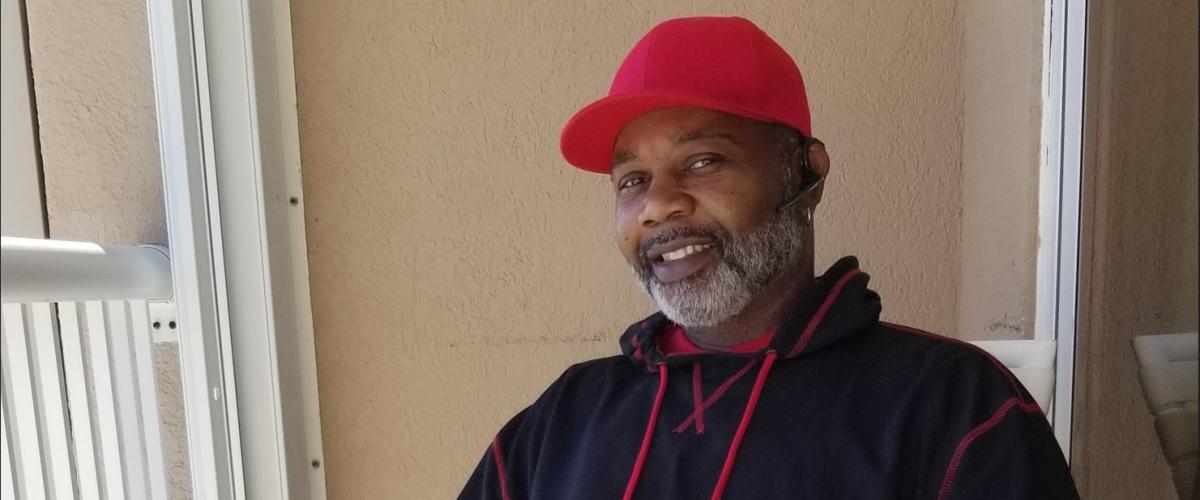
“It took me almost a year and a half to get diagnosed because I was afraid. Looking back, I wanted to blame my symptoms on diabetes, alcohol use, or high blood pressure--anything except Parkinson’s,” Monroe said.
Twelve years later, continued management and a procedure known as deep brain stimulation (DBS) have greatly reduced Monroe’s symptoms and helped him and live a life with, but not defined by, Parkinson’s disease. Monroe has also become an advocate to help other people learn more about Parkinson’s and how to receive the care that’s best for them.
Monroe came to the Duke Movement Disorders Clinic in 2016, shortly after moving back to his hometown of Durham, North Carolina. “From day one the whole Duke team was like my family,” Monroe said. “They listened to me, asked how I’m doing, wanted to know honestly, explained what my options are, and wanted me to make decisions that are best for me.”
During one of their early visits, Scott mentioned a procedure known as deep brain stimulation, or DBS. In this procedure, a neurosurgeon implants electrodes into specific parts of the brain and connects them to a small battery placed just under the skin in the chest. The battery delivers electrical impulses to the brain that modify abnormal brain activity. While not a cure, this procedure greatly reduces symptoms and improves quality of life for many patients.
Monroe, however, was hesitant. “I was still in denial. Being new to the game and not having many symptoms besides tremoring I said no thanks, maybe later,” Monroe said.
That hesitancy lasted for almost four years. During that period, Monroe dealt with both progressing symptoms of Parkinson’s as well as feelings of grief and depression. “Everyone who gets this disease asks themselves, ‘Why me? What did I do to deserve this, and what could I have done differently?’”
After years of consideration and prayer, Monroe opted for DBS and received the procedure on February 4, 2020, just weeks before the first peak of the COVID-19 pandemic. Monroe remembers the moment the Duke team turned on the DBS device. “I felt this pulse, and then for the first time in years, I stopped trembling. I fell into a calm, relaxing state. If I had known what life after DBS would have been like, I would have got it as soon as possible,” Monroe said.
DBS eased Monroe’s symptoms, allowing him to walk, move, and function in daily life more easily. He was also able to cut back on his medications to about half of what he had been taking before. Monroe continues to receive care from both Neurologist Jeffrey Cooney, MD and Physician Assistant Kim Struble, PA-C to manage his Parkinson’s as well as complications of the condition.
“Greg is always upbeat, and looks at the positive side of life,” said Struble. “He likes to joke around, and works to stay active. He’s also been very involved in the local Parkinson’s community,” Struble said.
Monroe, now 54, now attends several triangle-based Parkinson’s support groups to connect with others living with the condition. He also speaks at fundraisers, gatherings, and with new Parkinson’s patients to break down myths, and encourage them to seek care, and let them know they’re not alone. Whether he’s speaking in front of a crowd or one-on-one with a new patient, Monroe works to be open and honest about life with Parkinson’s.
“It’s not all peaches and roses. I still have issues from time to time. Parkinson’s will humble you,” said Monroe. “But it’s not all bad either. It will bring you closer to your family, and help you understand the simple things in life are the most important and the most powerful.”
Monroe said the most important thing anyone with Parkinson’s can do is to keep fear from letting you take action.
“Don’t be afraid. Stay in prayer. Continue to exercise, do what you can. Find a community, with people you can talk to… you can call me!” Monroe said. “We can beat this together.”